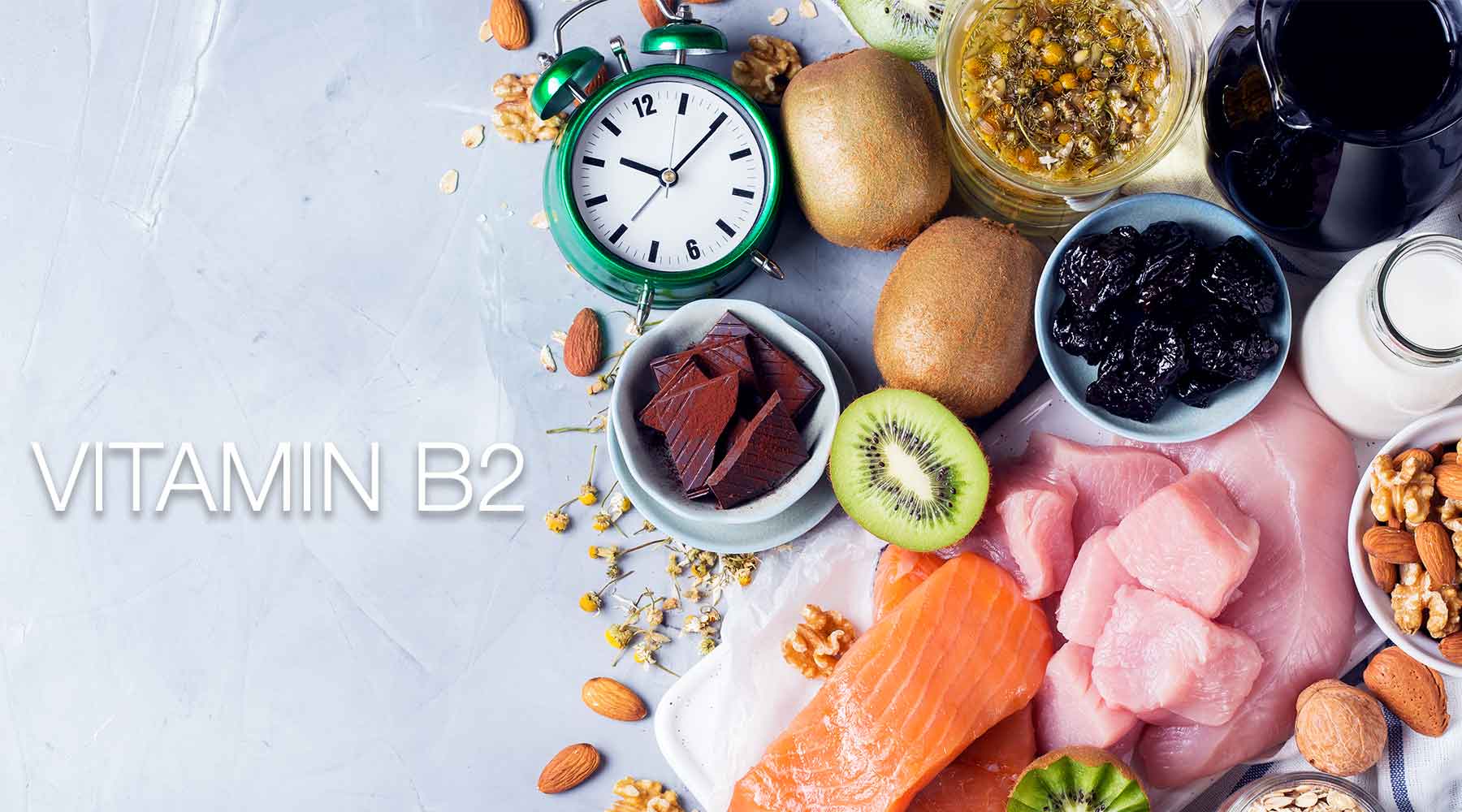
The vitamin B2 (riboflavin) and sleep
Vitamin B2, also known as riboflavin, is involved in numerous biological processes in our body and can also have a significant impact on our sleep. Learn here why a sufficient supply of vitamin B2 can improve our health and sleep.
Table of contents
- What is Vitamin B2 (Riboflavin)?
- Overview of the functions of vitamin B2
- Vitamin B2 & Sleep
- The best sources of vitamin B2
- Vitamin B2 in dietary supplements
- Conclusion
1. What is Vitamin B2 (Riboflavin)?
Vitamins are vital substances that play a key role in almost all processes in our organism and are therefore essential for normal bodily function. Vitamin B2 is also known as riboflavin and belongs to the group of water-soluble vitamins. It plays an important role in our energy metabolism and also influences our blood circulation, cellular health, and the nervous system. Other (B) vitamins also require riboflavin to function properly.
We explain in this article.
Since vitamin B2 cannot be stored in the body, a daily intake through diet is very important. A vitamin deficiency, especially over a long period of time, can be detrimental to health, leading to mental and physical impairments and also significantly disrupting our sleep. Common symptoms of a vitamin B2 deficiency include (inflammatory) changes in the skin and mucous membranes, for example, inflammation in the corners of the mouth, dry lips, cracked nails and greasy hair. It can lead to growth, concentration and Sleep disorders Headaches, dizziness, and mood swings can also result from a riboflavin deficiency. This sensitive vitamin is involved in numerous important bodily functions and has a major influence on our health and well-being.
2. Overview of the functions of vitamin B2
Controls energy metabolism & metabolism
Vitamin B2 is used in the body for the metabolism of carbohydrates, fats and proteins and converts these nutrients into energy to maintain healthy brain, nerve, digestive, and hormonal function. Without vitamin B2, many food molecules cannot be properly digested and processed.
Promotes blood circulation & immune system
Riboflavin is essential for the formation of fresh red blood cells and antibodies in our blood. This has a positive effect on the blood flow and oxygen supply to our organs, preventing anemia. It also protects the body's cells from damage and oxidative stress and has a positive influence on the Immune system.
Protects the nervous system
Our nervous system also depends on a sufficient supply of vitamin B2. It helps calm the nerves, reduce stress reactions, and also controls important hormonal processes that affect our mood, Body temperature, affect appetite and energy balance.
Supports healthy skin, hair and mucous membranes
Vitamin B2 supports body growth and contributes to normal collagen formation. It has a positive effect on the maintenance and development of important tissue structures, such as the skin, hair, nails, mucous membranes, connective tissue, and eyes, and has a positive effect on wound healing processes.
3.Vitamin B2 & Sleep
A vitamin deficiency can impede healthy bodily function and thus significantly disrupt our sleep, negatively affecting, for example, falling asleep, sleep quality, and sleep duration. Conversely, poor sleep increases our daily need for vital nutrients.

While we sleep, our body is busy recovering from the stresses of the day, cleaning up, and gathering energy for the new day. This process breaks down waste products produced during the day, repairs cell damage, builds tissue structures, and provides new energy. Due to its positive effect on energy metabolism, blood circulation, and cell health, riboflavin contributes to the optimal functioning of these cleansing processes and also helps replenish the body's own energy reserves. This improves regeneration during the night, allowing us to start the day feeling fresh and rested in the morning. Vitamin B2 is therefore an important factor in preventing insufficient recovery during sleep and the resulting fatigue and counteract feelings of fatigue during the day. It therefore has a positive effect on sleep quality and also improves sleep effectiveness.
Tip: In order for our body to function healthily and for sleep to be holistically restful, we should always ensure that we have a balanced vitamin and Mineral supply because many vital substances depend on each other for their function or effect.
4. The best sources of vitamin B2
The German Nutrition Society (DGE) recommends a daily intake of 1–1.4 milligrams of vitamin B2, depending on age and gender. The European Food Safety Authority (EFSA) recommends about 1.6 mg for adolescents and adults. However, approximately 26% of women and 20% of men consume less than the recommended daily amounts. of vitamin B2. However, severe vitamin B2 deficiency is rare and often occurs as a result of illness and surgery or when taking certain medications (e.g., antidepressants).

Foods that are naturally rich in vitamin B2 include:
- Milk and milk products
- offal such as liver and kidney
- Soybeans
- Mushrooms
- Almonds
- Whole grain products
5. Vitamin B2 in dietary supplements
With a balanced and healthy diet The daily requirement of vitamin B2 can usually be met. Additional intake in the form of dietary supplements can help to safely reach the recommended amounts – because, according to current knowledge, an increased vitamin B2 intake cannot cause harm. Even high amounts have not shown any adverse health effects in medical studies, which is why there is no legally established maximum amount of vitamin B2 in dietary supplements.
A dietary supplement with vitamin B2 can therefore be useful to prevent metabolic disorders, inflammation, sleep disorders or lack of energy.However, if you want to take a dietary supplement containing vitamin B2, you should always pay attention to the high quality and safe origin of the ingredients it contains.
Tip: Our
6. Conclusion
-
Vitamin B2 (riboflavin) is a water-soluble vitamin that influences energy metabolism, blood circulation, cell health and the nervous system in our body.
-
Vitamin B2 can have a positive effect on our ability to regenerate and the quality of our sleep, which promotes a refreshed feeling in the morning and counteracts fatigue.
-
Foods with a naturally high riboflavin content include dairy products, animal products such as meat and offal, and plant foods such as soy, legumes, and whole grains.
-
Riboflavin supplements are generally safe and well-suited to meet daily needs or to prevent inflammation, sleep disorders, and metabolic disorders.
Best wishes and see you soon!


Leave a comment
This site is protected by hCaptcha and the hCaptcha Privacy Policy and Terms of Service apply.